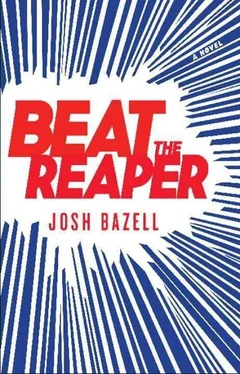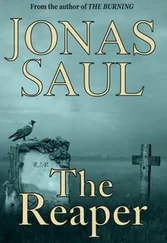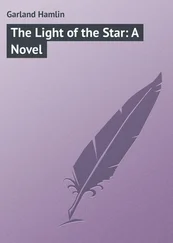“Funny stuff, you assholes,” Friendly starts up again, suddenly. “How many years of training do I have? Eleven? Fifteen? More, if you count high school. For what? So I can spend all day with a bunch of uneducated morons, breathing in genital wart particles from the Bovie and watching my salary go to my ex-wife and half the HMO executives in America. I mean, you people breathe the particles in too. But still.”
His movements are getting a little jerky. Or else maybe that’s just my rapid sleep-wake cycle.
“Oh, but that’s right,” Friendly says. “ I get to save people. People like this pinkie ring asshole, who’s spent his whole life eating beef and smoking cigarettes, and sitting on his ass.”
I say, “Suture,” and start tying off one of the larger arteries. The stitch breaks in my hand. I ask for another one.
“The fucking beef industry and the fucking HMO industry,” Friendly says. “Al-Cowda and the HMOsamas. They make my life hell while other people slack off. I bet tobacco’s a lot of fun. All kinds of things I never did are probably fun. Like when I was in med school, and you all were out in the park, smoking weed and listening to Marvin Gaye while you fucked each other.”
This time I tie my stitch more gently, and it holds. I’m surprised at how quickly the knot tying comes back to me, particularly with my forearm starting to make my fingers stiffen up. But anything someone teaches you to do first to the foot of a dead pig, then to the foot of a dead human, and finally to the foot of a live human, probably sticks in your memory permanently.
“Suture,” Friendly says. The instruments nurse gives a stitch to Friendly, but it gets tangled in Friendly’s fingers, and Friendly angrily shakes it off into Squillante’s open abdomen.
“You know what I should have done?” Friendly says. “I should have been a snake handler. It’s the same job but the pay is higher. Instead I save the lives of people who hope they’ll die on my table so I can get the shit sued out of me. Because that’s all anybody wants: a chance to take a queen out with a pawn.”
“Dr. Friendly?” the scrub nurse says.
“What?” Friendly says.
“Who’s the queen in this scenario?”
There’s another round of mask-hidden laughter.
“Fuck you!” Friendly says, grabbing up the knotted length of stitch and throwing it at the scrub nurse’s face. It’s too light to make it that far, though, and it arcs toward the ground.
For a second none of us realize that Friendly’s other hand has plunged his Bovie into Squillante’s spleen.
Not just into it, either. Along it, slicing as it went. As we watch, the incision beads with blood, then starts to gush.
“Oh, fuck,” Friendly says, yanking the Bovie free.
The spleen is essentially a bag of blood about the size of your fist, to the left of your stomach. In seals, whales, and racehorses it’s large and holds an extra supply of oxygenated blood. In humans it mostly strains out old or damaged red blood cells, and also has places where antibodies can go to clone themselves when they get activated by an infection. You can live perfectly well without a spleen, and people who survive car crashes or have sickle-cell anemia frequently do. But you don’t want to rupture it suddenly. Because almost as many arteries lead to the spleen as lead to the stomach, so losing blood from there can kill you fast.
Friendly rips the Bovie out of its power source and throws it to the ground, shouting “Give me some clamps!”
The scrub nurse calmly says “Bovie down,” and tosses a handful of clamps onto the tray. Friendly grabs a couple and starts trying to pull the edges of the spleen wound together.
The clamps tear right out, taking most of the surface of the spleen tissue off with them.
Squillante’s blood starts to pulse out in sheets.
“What’s happening?” the anesthesiologist yells from the other side of the curtain. “BP just dropped ten points!”
“Fuck off!” Friendly says, as we both go into action.
I grab a couple of clamps myself and start hunting out arteries. Just the biggest ones, since they’re all I can see through the fountaining blood.
Friendly doesn’t hassle me when I clamp the left gastroepiploic artery, which runs toward the spleen along the bottom of the stomach. I’m not sure he even notices. But when I go for the splenic artery itself, which comes off the aorta like a spigot, he swats my hand away, causing me to almost kill Squillante outright.
“What the fuck are you doing!?” he yells.
“Hemostasis,” I tell him.
“Fucking up my arteries, more like!”
I stare at him.
Then I realize that he actually thinks it’s possible to save Squillante’s spleen, rather than tying it off and removing it.
Because if he saves it he won’t have to report slicing it open as a complication.
The alarm goes off on Squillante’s blood pressure monitor. “Get him under control!” the anesthesiologist yells.
Leading with my shoulder in case Friendly gets rambunctious again, I try once more for the splenic artery, and this time I get it closed off about an inch downstream of the aorta. The blood loss out the spleen slows to a wide, shallow leak, and the blood pressure alarm shuts off.
“Suture and needle,” Friendly says through his teeth.
Friendly starts to sew the wreckage of Squillante’s spleen into an ugly little lump. Halfway through, the needle breaks off.
“Stacey!” Friendly screams. “Tell those fuckers to learn to make sutures, or I’m going to Glaxo!”
“Yes, doctor,” Stacey says from somewhere that sounds far away.
The next stitch holds better, or Friendly doesn’t yank on it as hard or something. “Can I have one of my arteries back now?” he asks me.
“It’s not going to hold,” I say.
“GIVE ME THE FUCKING SPLENIC.”
I separate the handles of the clamp that’s holding the splenic artery closed. The spleen slowly reinflates.
Then it splits in half along either side of the sewn-up incision, and sprays blood everywhere. As Friendly hurls the clamp in his hand against the wall, I reclose the splenic artery.
“Clamp on the floor,” the instruments nurse says casually.
“I’m taking the spleen out,” I say.
“Fuck you. I’ll do it,” Friendly says.
“I want to transfuse,” the anesthesiologist says.
“Fine!” Friendly yells at him. “Hook him up, Constance.”
Constance opens up a Coleman ice chest that says “Friendly” on it in permanent marker, and pulls out two bags of blood.
“Is that shit cross-checked?” the anesthesiologist asks.
“Do your job,” Friendly tells him.
Together, Friendly and I remove Squillante’s spleen. It takes about an hour and a half. Friendly then orders one of my med students to run it down to Pathology, so that he can later claim he took it out on purpose, looking for cancer. Which I have to admit is a nice recovery.
After that, the actual removal of the stomach is slow but mindless. We’ve already whacked half the arteries in Squillante’s abdomen. There’s nothing left to bleed. He’s lucky he still has blood going to his liver and colon.
Reconnecting the esophagus to the intestine is more irritating, like sewing two pieces of cooked fish together. But even that gets done eventually.
“Go ahead and close,” Friendly finally says to me. “I’ll go do the op report.”
Closing will take at least another hour, and I’m as tired as I’ve ever been in my life. Plus the fingers of my right hand are cramping almost to the point of uselessness.
But I’d rather close Squillante up alone than with Friendly. There are so many layers in the human body that even a good surgeon will skip sewing some of them up if the operation’s running late. As long as the layers closest to the surface are done, the patient won’t know the difference. They’ll just be more likely to rupture later on.
Читать дальше










